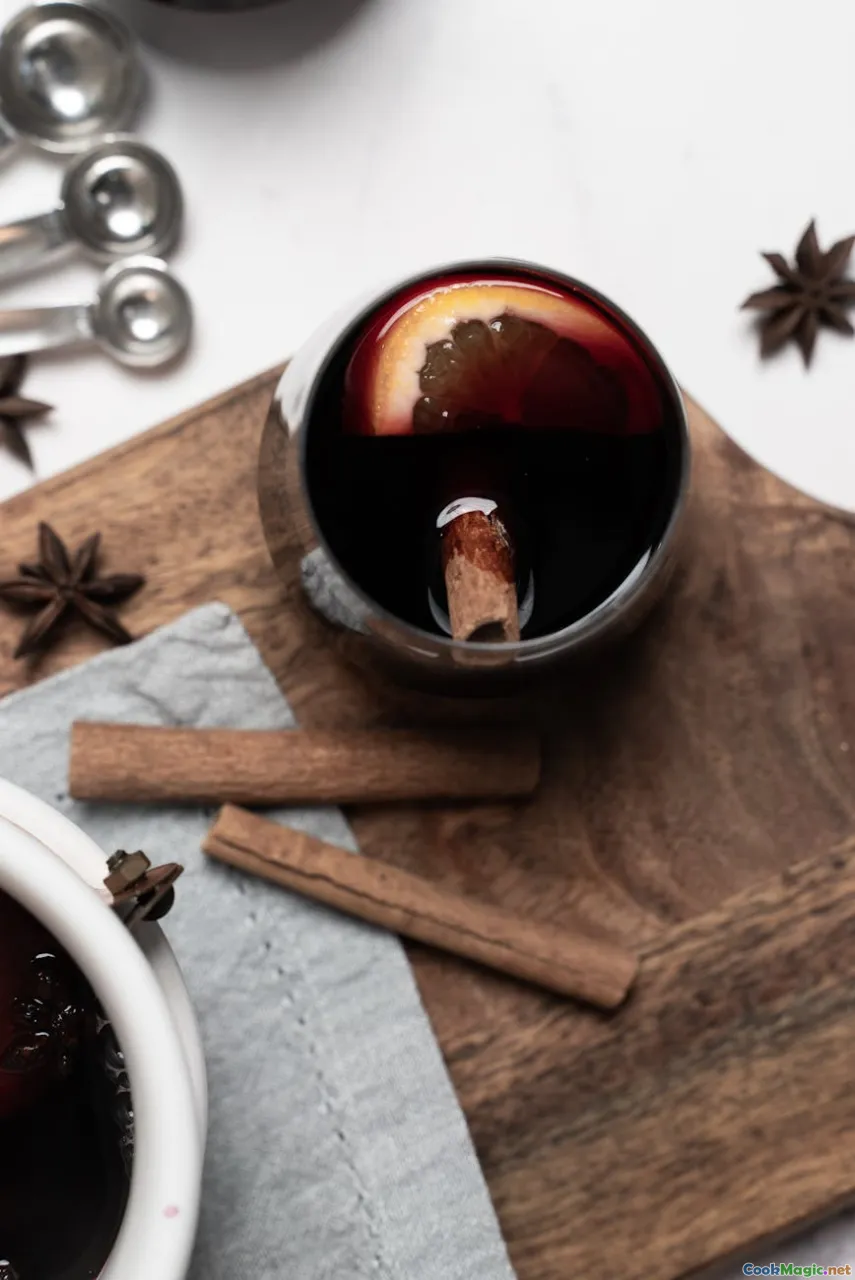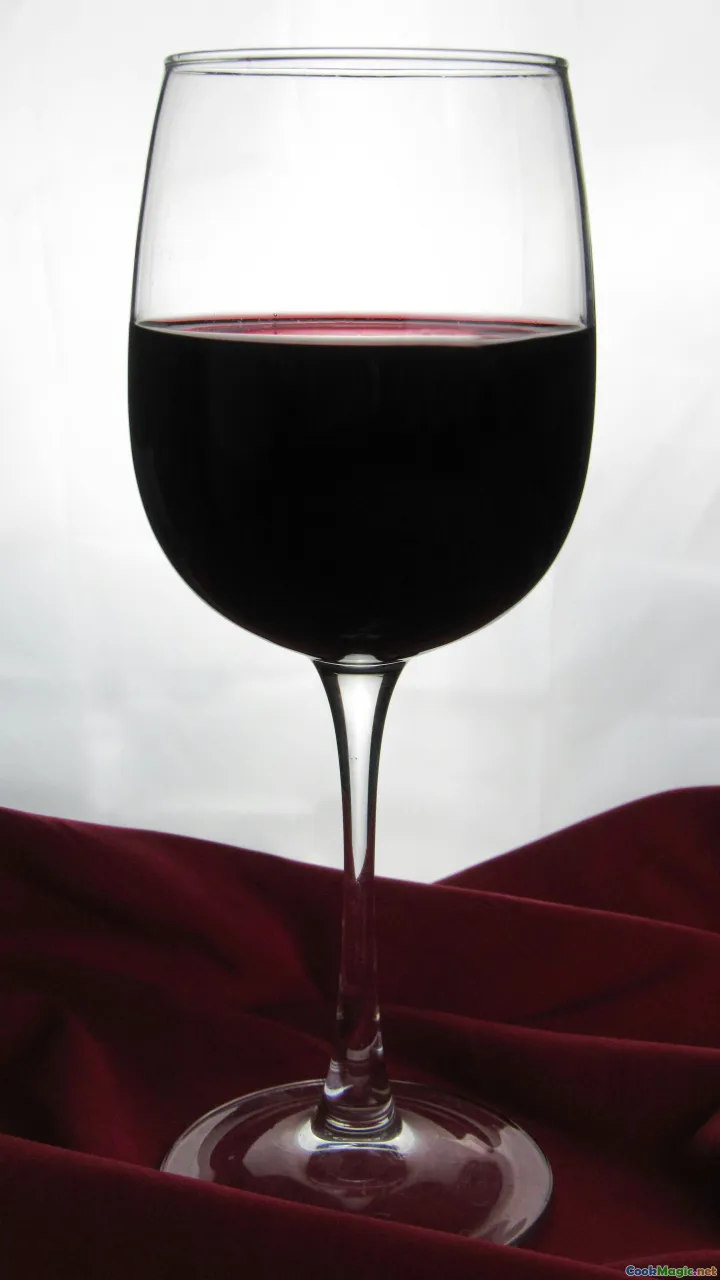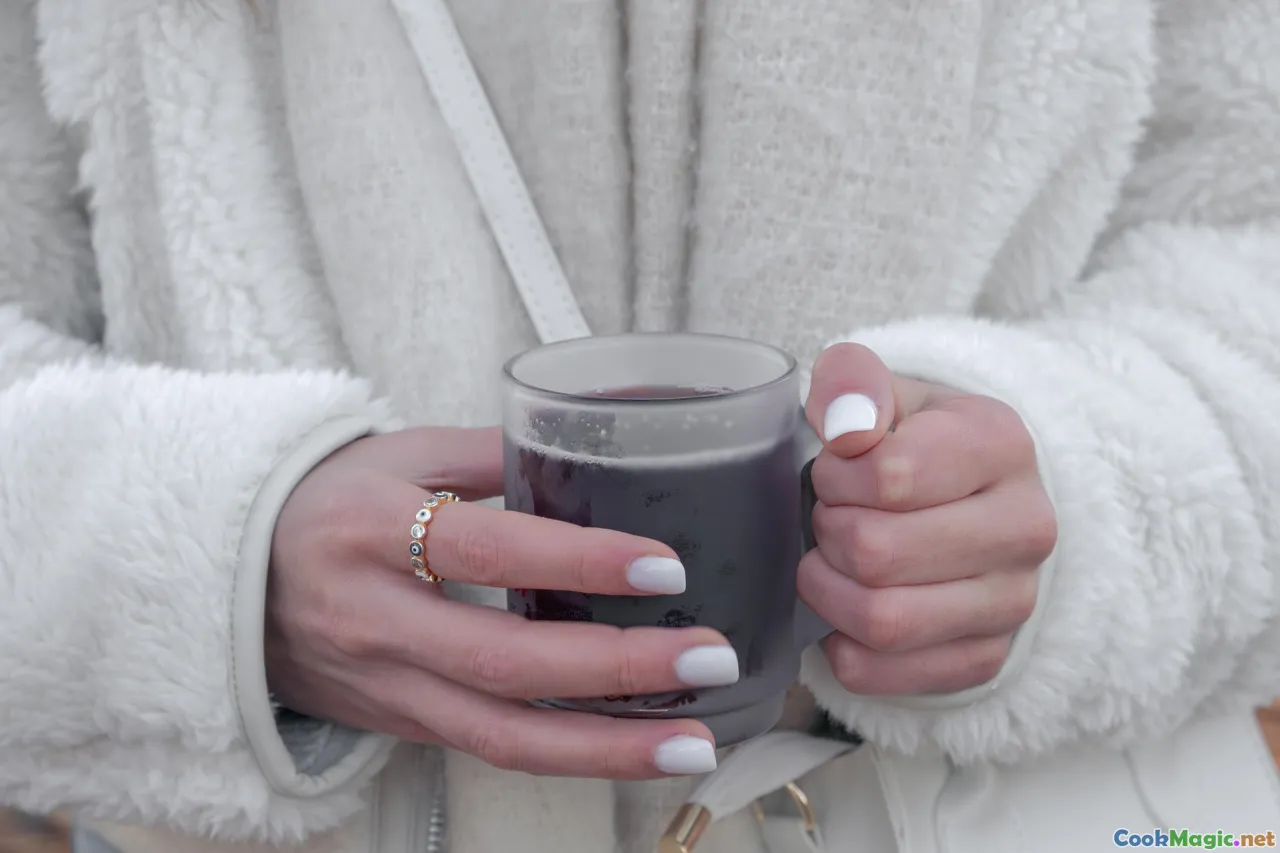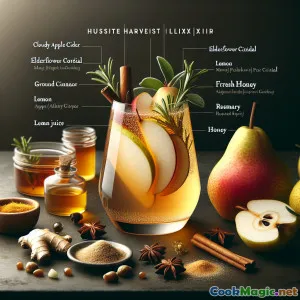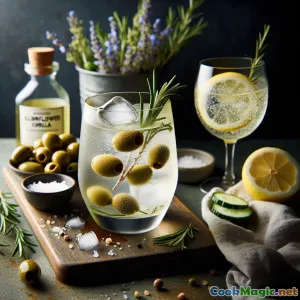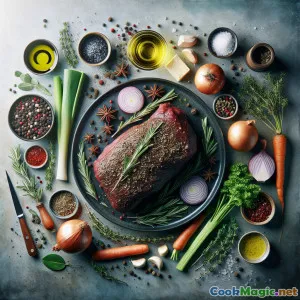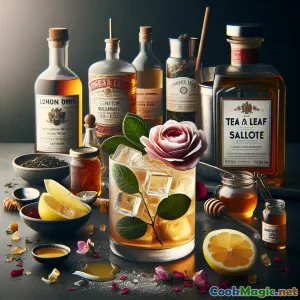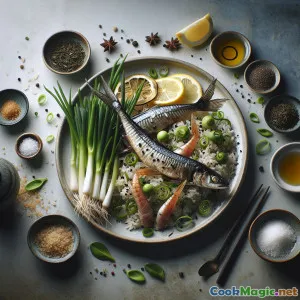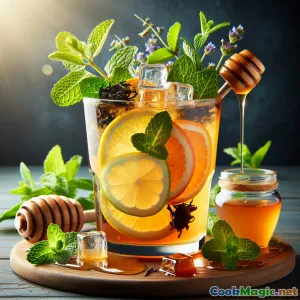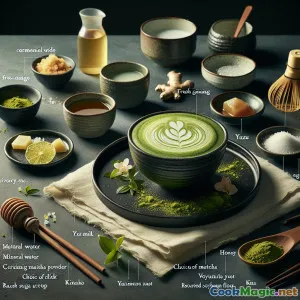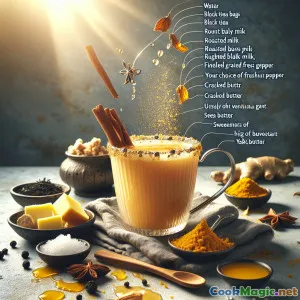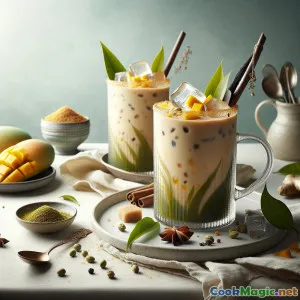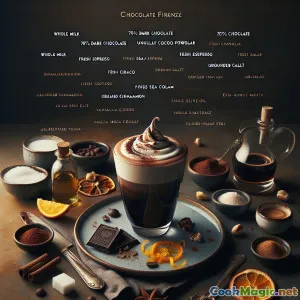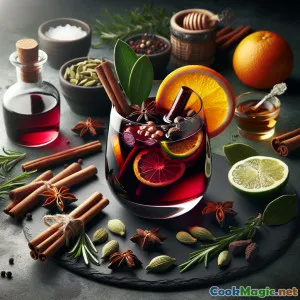
Mönchs-Melange: Würziger Englischer Glühwein
(Monk’s Melange: Spiced English Mulled Wine)
(0 Bewertungen)0
827
Juli 13, 2025
Problem melden
Zutaten
-
750 ml Trockener Rotwein
(Bevorzugt englischer Pinot Noir oder ähnlicher Wein)
-
50 ml Holunderblütenlikör
(Verleiht eine einzigartige blumige und krautige Tiefe)
-
4 tbsp klares Honig
(Traditioneller Süßstoff in klösterlichen Rezepten)
-
1 whole Orange
(In Scheiben geschnitten, möglichst biologisch)
-
4 pods Grüne Kardamomkapseln
(Sanft zerdrückt für besten Geschmack)
-
6 whole Nelken
-
2 sticks Zimtstange
-
0.25 tsp Muskatnuss
(Frisch gerieben für Aroma)
-
2 sprigs Frischer Rosmarin
(Gespült und leicht zerdrückt)
-
1 whole Lorbeerblatt
-
1 tsp Zitronenschale
(In dünnen Scheiben schneiden; die weiße Haut vermeiden)
-
50 ml Brandy
(Optional, für zusätzliche Wärme)
(Bevorzugt englischer Pinot Noir oder ähnlicher Wein)
(Verleiht eine einzigartige blumige und krautige Tiefe)
(Traditioneller Süßstoff in klösterlichen Rezepten)
(In Scheiben geschnitten, möglichst biologisch)
(Sanft zerdrückt für besten Geschmack)
(Frisch gerieben für Aroma)
(Gespült und leicht zerdrückt)
(In dünnen Scheiben schneiden; die weiße Haut vermeiden)
(Optional, für zusätzliche Wärme)
Nährwerte
- Portionen: 4
- Portionsgröße: 1 Tasse (200 ml)
- Calories: 230 kcal
- Carbohydrates: 0 g
- Protein: 0.5 g
- Fat: 0.1 g
- Fiber: 1 g
- Sugar: 17 g
- Sodium: 8 mg
- Cholesterol: 0 mg
- Calcium: 25 mg
- Iron: 0.6 mg
Anweisungen
-
1 - Obst und Kräuter vorbereiten:
Die Orange in dünne Scheiben schneiden, die Zeste der Zitrone (falls verwendet) abreiben, Kardamomkapseln vorsichtig zerdrücken und Rosmarin sowie Lorbeerblatt abspülen.
-
2 - Zutaten Kombinieren:
In einem großen Kochtopf den Rotwein, Holunderblütenlikör und Honig eingießen. Die vorbereiteten Früchte, Kräuter und alle Gewürze hinzufügen.
-
3 - Sanft erhitzen:
Die Mischung bei niedriger Hitze erwärmen. Nicht zum Kochen bringen; lassen Sie sie sanft dämpfen und 15-20 Minuten ziehen.
-
4 - Letzter Schliff und Abseihen:
Fügen Sie Branntwein für einen zusätzlichen Geschmack hinzu, falls gewünscht. Nehmen Sie es vom Herd, entfernen Sie die Feststoffe und seihen Sie die Flüssigkeit durch ein feines Sieb ab.
-
5 - Servieren und Garnieren:
In warme Tassen gießen. Mit einer Orangenscheibe, Rosmarinzweig oder einem Zimtstängel garnieren für Aroma.
Die Orange in dünne Scheiben schneiden, die Zeste der Zitrone (falls verwendet) abreiben, Kardamomkapseln vorsichtig zerdrücken und Rosmarin sowie Lorbeerblatt abspülen.
In einem großen Kochtopf den Rotwein, Holunderblütenlikör und Honig eingießen. Die vorbereiteten Früchte, Kräuter und alle Gewürze hinzufügen.
Die Mischung bei niedriger Hitze erwärmen. Nicht zum Kochen bringen; lassen Sie sie sanft dämpfen und 15-20 Minuten ziehen.
Fügen Sie Branntwein für einen zusätzlichen Geschmack hinzu, falls gewünscht. Nehmen Sie es vom Herd, entfernen Sie die Feststoffe und seihen Sie die Flüssigkeit durch ein feines Sieb ab.
In warme Tassen gießen. Mit einer Orangenscheibe, Rosmarinzweig oder einem Zimtstängel garnieren für Aroma.
Mehr über: Mönchs-Melange: Würziger Englischer Glühwein
Monk’s Melange Mulled Wine: English Monk’s Craft in a Mug
When the wind howls and rain taps against ancient windowpanes, few comforts compare to a mug of aromatic, spiced mulled wine intertwined with England’s monastic legacy. Monk’s Melange Mulled Wine draws inspiration from medieval English abbey kitchens, where resourceful monks coaxed flavor from herbs, honey, and garden bounty—creating warming libations especially during the Winter Solstice and festive gatherings.
A Drink Steeped in History
England’s love affair with mulled wine began many centuries ago. Medieval monks, adept at herbology and brewing, often devised recipes employing local botanicals, spices from trade routes, and wine pressed from native grapes. This recipe tips the cassock to tradition, integrating contemporary English flavors—like elderflower—and fragrant rosemary, which historically symbolized remembrance and fidelity.
Wine was a staple in monastic life; it was cleaner than unfiltered water, used for both liturgical and medicinal purposes. Honey sweetened their brews long before cane sugar became prevalent. Today, we borrow these heritage techniques, infusing wine not just with expected spices but also with local herbs and English orchard fruit, evoking the ancient yet timeless pleasure monks knew.
Crafting the Monk’s Melange
Key unique aspects: the inclusion of elderflower liqueur lends fresh floral notes seldom found in mulled wine, echoing meadow-like undertones of English countryside. Rosemary and bay—straight from the monastery garden—bring a gently earthy balance to orange citrus and heady warm spices.
Honey, unlike refined sugar, brings both nuanced sweetness and ennobling flavor. You could play with regional honeys (like heather or wildflower), subtly altering the drink for different palates—or leave it out for a drier profile. Lemon zest brightens the blend, preventing it from veering too syrupy—another craftsmanlike touch.
Brandy is strictly optional, but it conjures up the sort of spirit monks might have bartered for in good times. Don’t boil your wine—heat gently and let it whisper with flavour, not scream with alcoholic loss.
Serving and Pairings
For the truest experience, serve Monk’s Melange hot in sturdy mugs alongside spiced fruitcake, oat biscuits, or simply good company in firelight. A rosemary sprig or a curl of orange peel improves both aroma and presentation—appealing to modern appetites while saluting monkish attention to beauty in the humblest details.
Tips and Notes
- Use a decent red wine you’d drink solo—mediocre wine makes for flat mulled concoctions!
- Curious to echo authentic herbology? Swap in sage or thyme but in modest quantities—a little goes a long way.
- When possible, source local botanicals, a touchstone to both tradition and sustainability.
- Any brand of elderflower liqueur (such as St-Germain) suffices, but you may increase punch or floral notes to your taste.
- Heating should never allow boiling; let the surface barely shimmer with steam.
Cultural Resonance
England’s mulled wine has been sipped along harvest tables, Yule feasts, and in retreat from rural chill for generations—its history seasoned by faith, science, and seasonal gratitude. Presenting this drink today, with sovereignty to old gardens and monastic inventiveness, puts us in touch with centuries past even as we savour contemporary comforts.
Each mug brims not just with robust wine, but remembrance, fragrance, and enduring hospitality—a true melange steeped in the wisdom and warmth of England’s spiritual heart.

